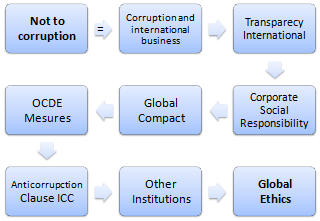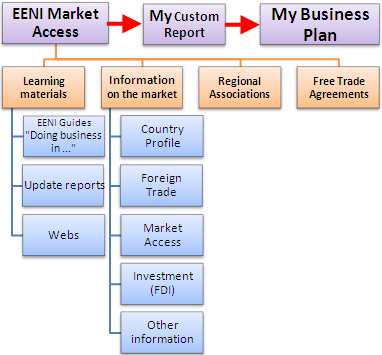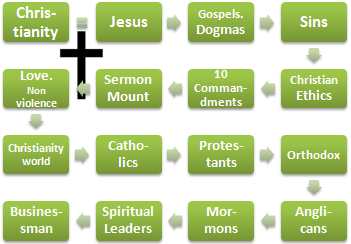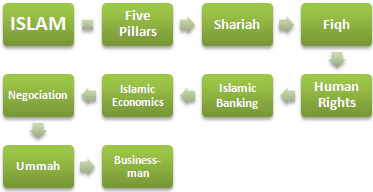Optional Subjects (Online Bachelor of Science, Africa)
Optional subjects of the Bachelor of Science in Inter-African Business, e-learning, 5 ECTS)
| Bachelor of Science in Inter-African Business |
Optional subjects - Bachelor of Science in Inter-African Business (Sixth semester).
The student must choose 5 ECTS between the list of proposed subjects:
- No to Corruption [4]
- Foreign Trade Documents [1]
- International Trade Finance [4]
- International Contracts [2]
- International Distribution [5]
- International Promotion [5]
- Intercultural Management [3]
- International Market Research [2]
- International Product Policy [2]
- Export Prices [1]
- Segmentation, Brand and Positioning [4]
- Ethics and Business [1]
- Introduction to Christianity (for the Muslim students) [4]
- Introduction to Islam (for Christian students) [4]
- Sport, cultural, cooperation or student representation [4]
- Mentor Students from the University [4]

Syllabus of the Subject: No to Corruption in International Trade (4 ECTS).


Objectives of the Program “No to Corruption in International Business”:
- To raise awareness about the terrible effects of the corruption
- To analyze the causes of corruption in International Business
- To know the tools that an export company can implement to fight against corruption
1- Transparency International and the fight against corruption
- Introduction to Transparency International
- Index of Corruption Perception
- World Corruption Barometer
- Index of bribery sources
- World report on corruption
- Principles of transparency and corruption prevention for businesses
- Index of corruption of the exporter countries
2- Corporate Social Responsibility (RSE).
- Introduction to the Corporate Social Responsibility
- Initiatives: the world report and InFocus (ILO)
- Dow Jones Index of Sustainability
- Social responsibility and the EU
3- Global Compact of the UN:
- Introduction to the Global Compact of the UN
- Ten principles of the Global Compact
- How to join to Global Compact
- United Nations Convention against Corruption
- Universal Declaration of Human Rights
- ILO Declaration on Fundamental Principles and Rights at Work
- Rio Declaration on Environment and Development
4- Anti-corruption Measures of the Organization for Economic Cooperation and Development (OECD).
- OECD Guidelines for Multinational Enterprises
- Convention on Combating Bribery of Foreign Public Officials in the international business transactions (OECD)
- Tax and Crime
- Fighting corruption in the public sector
- Guidelines for managing conflict of interest in the public service
- Bribery in the Public Procurement
- Good Practice Guidance on Internal Controls, Ethics, and Compliance
- Role of intermediaries in the international business transactions
- Electronic sales suppression
- Business integrity in Africa
5- Anti-corruption Clause of the International Chamber of Commerce
- Introduction to the International Chamber of Commerce (ICC)
- Anti-corruption Clause of the International Chamber of Commerce
- Implementation of the Anti-corruption Clause
- Scheme of the Anti-corruption Clause
6- Institutions and Initiatives related to the fight against international corruption.
- Group of States against Corruption
- Stolen Asset Recovery Initiative
- International Anti-Corruption Academy
- Inter-American Convention against corruption
- Ibero-American Code of good government
- Financial Action Task Force
- World Economic Forum Partnering Against Corruption Initiative
- Global Financial Integrity
- Fight against corruption of the EU
7- African Union Convention on Preventing and Combating Corruption.
- Regional Anti-Corruption Programme for Africa
- African Union Convention on Preventing and Combating Corruption
Syllabus of the Subject: Import/Export Documents (1 ECTS).
- Documents in Import/Export transactions
- Documents of origin (certificate of origin...)
- Trade Documents (proforma invoice, invoice, packing list...)
- International Transport Documents (bill of lading B/L...)
- Administrative Documents
- Other documents related to International Trade
- Case Study:
- Documents required for export fish to Angola
- Documents needed to export to Brazil
Objectives of the Program “International Trade Documents”:
- To know Foreign Trade documents
- To know how to fill import/export documents
- To know how to perform the corresponding check-lists
Syllabus of the Subject: International trade Finance (4 ECTS).
1- International Finance
- Export/import financing
- Risks of the export activity
- Country Risk
- Finance and pre-finance export credits
- Export credits (OECD)
- Other forms of Foreign Trade finance
- Case Study
2- Foreign Exchange Market (FOREX).
- Introduction to Foreign Exchange Market (FOREX)
- Global Financial Crisis
- Currency trading
- Players: Central banks, companies, brokers, hedge funds, investors, and speculators
- Currency exchange rates
- Methods of managing the exchange risk
- Types of coverage
- Exchange risk insurance
- Forward exchange contracts and currency options. Call/Put Options
- Spot Market and Forward Market
- European Central Bank. The Euro
- Role of the Bank for International Settlements
- Tobin tax
- Vulnerability analysis
- Case Study: the balance of payments as a tool for credit risk analysis of a market
3- International Bonds and Guarantees:
- Introduction to the International Bonds and guarantees
- Advance/progress Payment Bond
- Tender and Performance Bonds
- Retentions and On-Demand Bonds
- Other types of guarantees
- Managing bonds and guarantees
- Customer liability records
- Bank obligations
- ICC Rules for the Issuance of Bonds and Guarantees
- Invoice discounting
- Bills of Exchange
- Endorsements
- Documentary Collections
- Clean Collection. Managing collections
- Factoring and Forfeiting
Objectives of the Program “International Finance”:
- To understand the modalities of export/import financing
- To understand the associated risks to the foreign trade transactions
- To know how to manage pre-financing and export financing
- To know the functioning of the international bonds and guarantees in foreign trade transactions
- To understand the role of the Foreign Exchange Market in foreign trade
Syllabus of the Subject: International Contracts (2 ECTS).
- Introduction to the International Contracts
- Risks of International Trade
- Instruments of risk minimization
- UNCITRAL
- United Nations Convention on Contracts for International Sale of Goods
- Vienna Convention on the Law of Treaties
- Hague Conference on Private International Law
- Clauses of an international contract
- Anti-corruption Clause of the ICC
- International Arbitration
- Case Study.
- Samples of Contracts: distributor, importer, agent
- Analysis of the International Sales Contracts
- Contracts of international distribution
Objectives of the Program “International Contracts”:
- To understand the key pillars and the importance of contracts in Foreign Trade
- To learn how to implement the main clauses of an international sales contract and how to minimise the risks
- To know the main international institutions and Conferences related to international contracts
- To know the functioning of an International Arbitration process
Syllabus of the Subject: International Distribution (5 ECTS).
1- International distribution:
- Introduction to the international distribution Policy
- Direct exports
- Foreign Trade Consultancy
- Associated exportation
- Export Consortia
- Trading Companies
- International distribution and e-business
- Value Aggregation to the international distribution network
- Case Study:
- Sogo Shoshas and Chaebols
- Toshiba
- The third Italy
- Mitsubishi Corporation
- Sanofi-aventis
2- Direct International Distribution
- International distribution through an importer or distributor
- International Representative
- Own staff of the company
- Joint Ventures
- Foreign subsidiaries: Sales and Production
- Internationalization through Licenses and Franchises
- Other forms of international distribution
- Case Study:
- Distribution in Japan of agri-food products
- Distribution in Saudi Arabia
- Analysis of the distribution strategies of several companies (Mango, Quilmes, Neck Neck...)
- Intel in Costa Rica
3- Sales Network Management.
- Selection criteria of salesman or distributor
- Profile of international salesman (distributor)
- Recruitment methods of distributors
- International Distribution Contracts
- Control of the International Representative
- Case Study:
- Formica Group
- AL-KO
- Group of investments Suramericana
- Experience of Motorola and Wal-Mart in China
The objectives of the subject “international distribution”:
- To learn about the importance of planning an appropriate international distribution strategy
- To analyze the functions of the importers and representatives
- To identify the distribution options available to the exporter
- To discuss the use of a company personnel and sales or production subsidiaries
- To outline the criteria to be used when selecting a distribution option
- To analyze the strategies that can be implemented for consumer and industrial products
- To select the channel options, that may be used when entering new export markets
- To analyze the process of evaluating, recruiting, and managing international sales representative
Syllabus of the Subject: International Promotion (5 ECTS).
1- International Promotion:
- Introduction to the international promotion Policy
- Local, regional and global promotion strategies
- Promotion Strategy and new export markets
- Direct and indirect international promotion
- MIX of international promotion
- Advertising and publicity
- International Promotion Campaign
- Public Relations
- Case Study
2- International Trade Shows.
- Importance of international trade shows in the internationalization process
- Objectives of the participation
- Preparation and organization of international trade shows
- Case Study
- Cosentino Group
- Trade shows in Germany and China
3-Country Brand.
- Concept of Country Brand
- Influence of the country brand on the international marketing
- Country Brand as a competitive advantage
- Strategy of internationalization and “Country Brand”
- International Rankings
- Rating Agencies
- Case Study:
4- International Business Trip.
- International Business Trips and international marketing
- Organization of the trip
- International Sales
- Post-trip activities
5- E-Promotion and international marketing
- Key concepts related to the e-Promotion
- Search engine positioning
- Promoting online effectively
6- Social networks and international promotion
- Web 2.0 in a globalized world
- Key Concepts: Folksonomy, mashup, Cloud computing
- Sharing content: Photos, documents and Video
- Business applications of Facebook and Twitter
- Professional Social Networks (LinkedIn, Xing)
- Use of Companies Blogs
- Business Models of the Company 2.0
The objectives of the subject “International promotion”.
- To understand the key areas of the international promotion
- To examine the promotion options available to the exporter
- To learn the importance of an appropriate promotion strategy when entering new export markets
- To outline the key points to note when designing an enterprise brochure and analyze the available tools when implementing a promotion campaign
- To understand the influence of a country's international brand on its export performance
- To understand the fundamentals of the international fairs (appropriate preparation and attendance) and its related follow-up activity
- To understand how to plan and prepare a business trip to a prospective export market and the follow-up, which will then be required
- To understand the basics of e-promotion and how to apply them to the international marketing
- To assess the importance of social networks in the International Marketing and know how to design a social networks strategy
Syllabus of the Subject: Intercultural Management (3 ECTS).
- Introduction to the Intercultural Management
- Culture and global society
- High and low context cultures (Edward Hall)
- Cultural dimension (Hofstede): Power distance, Individual, and Long-Term Orientation
- Hofstede dimensions and Religions of the World
- Seven dimensions of culture
- Cross-cultural communication and International Marketing Plan
- Intercultural Management and international business
- Key strategies for dealing with new cultures
- Case Study: Ceramic tiles perception in different markets
The objectives of the subject “Intercultural Management”:
- To understand the importance of the Intercultural Management in Foreign Trade
- To define the international cultural patterns
- To know how to design Intercultural Management Strategies
Syllabus of the Subject: International Market Research (2 ECTS).
- International Market Research
- How to export?, Where to export?, What to export?
- Methods of realization of an International Market Research
- Quantitative analysis
- Qualitative methods
- Analysis PEST (politician, economic, social and technological)
- Examples of the international market research
- Case Study:
- Analysis of an International Market Research
- Market profitability
- Sales potential in the foreign markets
- Market research using the market access tool of the EU
The objectives of the subject “International Market Research”
- To understand the importance of the international market research in the strategies of Internationalization
- To know how analyze an International Market Research
- To know how to use the analysis PEST (politician, economic, social and technological)
Include the tool EENI market access.

Syllabus of the Subject: Export Product/Service Policy (2 ECTS).
1) Product/Service International Strategies.
- Introduction to international product strategies
- Standardization, adaptation, and diversification of products and services;
- Globally standardized products and services
- Locally adapted products and services
- Brand and product/service policy
- Business portfolio. BCG Growth-Share Matrix. McKinsey matrix. Experience curve
- E-Product. Digital value. Pervasive computing
- Case Study:
- Silicon Graphics
- Johnson and Johnson
- Unilever
- General Motors
- Tantrix
- Linux
2) Quality and International Marketing
- Quality and international marketing
- Standards and certifications
- Case Study: the CE Mark
The objectives of the subject “International product policy”:
- To know how to design product/services strategies for the international markets
- To learn the importance of adapting an export product or service to the local or regional requirements when entering new export markets
- To know how to add value to a traditional product with value digital services
Syllabus of the Subject: International Pricing Policy (1 ECTS).
- Introduction to the International Pricing Policy
- Calculation of the export prices
- Export prices and Incoterms® 2020
- International prices strategies
- Product life cycle and international pricing policy
- Pricing options available to the exporter
- E-Business and pricing policy
- Case Study:
- Pricing Policy and Inflation
- Pricing Policy of NINTENDO
- Pricing Policy for Latin America (Iberian America)
The objectives of the subject “International Pricing Policy”.
- To understand the importance of the international Pricing Policy
- To know how to design an international Pricing Policy and evaluate its repercussion on the international marketing mix
- To learn how to calculate the export prices for the different markets
Syllabus of the Subject: Segmentation, Brand and international market positioning (4 ECTS).
1- International segmentation.
- Importance of the International market segmentation
- Criteria for the market segmentation
- Phases of an international segmentation process
- Niche markets and segmentation
- Market segmentation strategies: concentrated, differentiated, product specialization, market specialization and total market coverage
- Case Study:
- Land Rover
- Arcor Group
- Melia Hotels
- Volkswagen
- Cencosud
2- Brand strategies and international market positioning.
- Brand importance in the strategy of Internationalization
- Brand value
- Brand strategies in foreign markets
- Global, regional and local brands
- International market positioning
- Positioning strategies
- Twenty-two Immutable Laws of Marketing
- Case Study:
- UNILEVER: brand regionalization strategy
- United Biscuits
- Ford Motor Company
- Positioning a new product in the Australian Markey
The objectives of the subject “Segmentation, brand and international market positioning”:
- To understand the importance of international segmentation in marketing and the strategies of Internationalization
- To know how to design a global or local brand strategy to the markets, as well as manage the brand in the international markets
- To know how Positioning a brand in the international markets
Syllabus of the Subject: Global Ethics and International Business (1 ECTS).
- Introduction to the Global Ethics
- Searching for a Model of a Global Ethics
- Religions as “Wisdom traditions” of humanity: one of the main global ethics sources
- Shared ethical principles of humanity. The Golden Rule (“Ethic of Reciprocity”)
- Two fundamental principles of the global ethics;
- Harmony of the religion
- Ahimsa (Non-Violence)
- Implications for the international marketing
- Businesspeople who apply models based on the global ethics
- Why do we need the global ethics?
The objectives are the following:
- To define the pillars of a Model of a Global Ethics
- To understand the religions of humanity as the sources of a Model of a Global Ethics
- To analyze the two fundamental principles of the global ethics: harmony of religions and Ahimsa (non-violence)
- To reflect the impact of the Model of a Global Ethics on the international business
- To analyze the profile of Businessmen who apply Models of Global Ethics
“The principle of the Non-Violence of Mahatma Gandhi and Sri Ramakrishna's testimony to the Harmony of Religions: here we have the approach and spirit that can make it possible for the human race to grow together into one family.” Arnold Toynbee.


Syllabus of the Subject: Christianity (for the Muslim students) (4 ECTS).
- Introduction to Christianity
- Christian Denominations
- Christianity in the World
- Introduction to Catholicism
- Introduction to Protestantism
- Introduction to the Orthodoxy
- Other Christian Denominations
- Economic Areas of the Western Civilization

Objectives of the Program “Christianity”:
- To learn the key pillars of Christianity
- To analyze the different Christian Denominations (Catholicism, Protestantism, Orthodoxy...)
- To understand the ethical principles of Christianity
- To know the distribution of Christianity in the World
- To analyze the influence of Christianity on Business
- To know the fundamental role of Christianity in the Economic Area the Western Civilization
- To analyze the Economic Areas of the Western Civilization
Syllabus of the Subject: Islam (for Christian students) (4 ECTS).
- Introduction to Islam
- Prophet Muhammad
- Holy Quran
- Expansion of Islam
- The first schism of Islam: Sunnis and Shiites
- Introduction to Sufism
- The Five Pillars of Islam: Profession of Faith, Prayer, Charity (Zakat), Fasting, and Pilgrimage to Mecca
- Cairo Declaration on Human Rights in Islam
- Muslim Community (Ummah) in the World
- Islam and Business
- Islamic Economic Area
- Introduction to the Sharia (Islamic Law), Fiqh (Islamic Jurisprudence), and Islamic Economics and Banking

Objectives of the Program “Islam”:
- To understand the pillars of Islam
- To analyze the main branches of Islam: Sunnis and Shiites
- To understand the ethical principles of Islam
- To analyze the concept of Muslim Community (Ummah)
- To analyze the influence of Islam on Business
- To understand the principles of Islamic Economy and Finance
- To know the fundamental role of Islam in the Economic Area of the Islamic Civilization
- To analyze the Islamic Economic Areas, the Economic Integration process and their interrelations with the other civilizations

- ECTS = European Transfer and Accumulation System
- CECT = Credit of Capitalisable and Transferable Evaluation (CAMES)
Language of the optional subjects of the Bachelor of Science in Inter-African Business (Sixth semester):  or
or  EENI
EENI  EENI
EENI  EENI.
EENI.
(c) EENI Global Business School (1995-2024)
We do not use cookies
Top of this page

